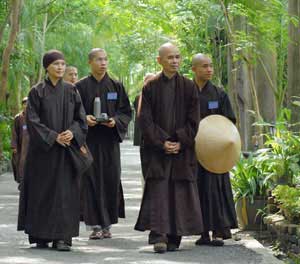Thich Nhat Hanh: Rights should be governed by goodwill, not hate
by SANITSUDA EKACHAI, Bangkok Post, June 2, 2007
Bangkok, Thailand -- Amid heightened political tensions in Thailand, the visiting Zen master Thich Nhat Hanh yesterday emphasised the importance to protect democracy, freedom of speech and assembly, while cautioning political parties to refrain from inciting hate, fear and violence. Both the people and political parties should be able to enjoy freedom of speech and to gather, he said. But these rights must be governed by goodwill, not hate or anger.

<< "The energy of compassion and understanding is the most powerful energy that can protect you" - Thich Nhat Hanh
"Political parties should not incite violence,'' he told the press during the last day of his two-week visit to Thailand.
''They should use loving speech. They should not incite people to be fearful and hateful. This should be the basic conditions for political parties.''
During his Thailand visit, deep listening and loving speech was the main theme of his teachings which he said could ease not only the conflicts in inter-personal relationships but also the more complex ones involving political rivalries, ethnic violence and wars.
Peace talks, however, often fail because the negotiators do not have spiritual training in deep listening and compassionate speech, which can help understand the suffering of the other side.
The Vietnamese-born Zen master and peace advocate was also asked for his opinions on the raging popularity of the Jatukarm Ramatep talismans, how to undo past karma, and how to make the competitive education system offer true and happy learning to students.
On the talismans, he said: ''The energy of compassion and understanding is the most powerful energy that can protect you.'' If one still has fear and anger, no matter how much one prays or what amulet one has, it will not help, he said.
The key to undoing past karma, meanwhile, is in making one's present moment governed by the right thoughts, right speech and right actions, he advised.
To rescue youth from misguided education, he said it is necessary to tackle the collective belief that the more money one has, the happier one is.
The practice of Buddhist teachings in daily life can help bring happiness into one's life, family and workplace ''here and now,'' he said.


